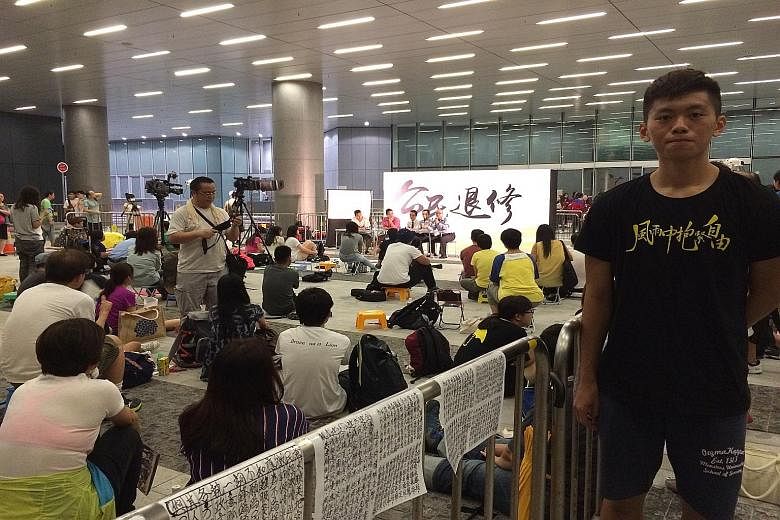One year ago yesterday, student protesters fuelled by anger and adrenaline stormed the Hong Kong government compound, triggering the start of the massive Occupy movement two days later.
Last night, metres from that site, activists began a subdued process of soul-searching into what went wrong, and what steps the pro-democracy movement should take in future.
Fewer than 50 people turned up for the seminar to mark the Sept 26 anniversary, a reflection of the movement's biggest challenge - how to regain the support of a public tired and cynical that any changes can be wrought.
Barricades were unbreached and police officers patrolling the area were clearly relaxed.
Student Wong Yiu Cho, 18, teared as he spoke of how he failed in urging his friends to turn up. "I didn't think there will be so few of us here. I asked my classmates to come but they seemed to have forgotten what we went through," he said.
Sept 26 of last year began peacefully enough - students gathered to urge Beijing to give Hong Kong greater freedom to elect their own leader. But speeches gave way to chaos when 150 of them, including Scholarism's Joshua Wong, made a break for the complex's forecourt.
In scenes that would soon become familiar in Hong Kong and beamed around the world, riot police with pepper spray faced off with the students who used umbrellas to shield themselves. A total of 74 protesters were arrested, 34 were hospitalised.
The action that night catalysed the start of the Occupy civil disobedience campaign, and on Sept 28, up to hundreds of thousands of Hong Kongers emerged in a show of support, paralysing major roads in Admiralty, Mong Kok and Causeway Bay. But Beijing did not budge, and the movement was soon laced with internal discord as public support flagged.
Last night, one clear consensus emerged: Hong Kong is not keen on more Occupy sit-ins anytime soon.
Mr Nathan Law, secretary-general of the Federation of Students (FS) which played a leading role in Occupy, told The Sunday Times: "Society, as a whole, wants peace. So in the near future, we have no concrete plans for any mass movements. Instead, we need to rethink our past actions and our future."
He said that there is a need to broaden the movement's modus operandi beyond sit-ins and street rallies. For instance, said Mr Law, "we need more protest tactics such as class boycotts and worker strikes".
Linked to this is the need to convince the larger society to support them, added the student activist, in an acknowledgement of one vital factor for Occupy's eventual failure - fading public support.
But even before that, the movement itself, sharply split, needs to forge consensus.
Some young activists led by Mr Wong are now calling for Hong Kong to have the right to "self-determination" after 2047, which is when Beijing's promise to leave Hong Kong unchanged 50 years after the 1997 handover expires.
Occupy co-founder Chan Kin Man last night urged the audience to consider very carefully the reality: that Beijing will not countenance any efforts by Hong Kong to challenge its sovereignty or the rule of the Chinese Communist Party.
"The young people will hate me but I have to make them realise this," he told The Sunday Times.
"They talk about independence. But unless there is a collapse of China, that would not be possible."
He called on Mr Wong to clarify what he meant, saying it is not feasible for Hong Kong to have a say in whether it should be independent, but it might be possible for the territory to have a part in rewriting the Basic Law in other areas.
"Democracy that does not violate sovereignty" is also possible, he added, referring to the right of Beijing to veto the choice of Hong Kongers.
Another area to work on is in mending the divisions among the students themselves.
Post-Occupy, the FS, Hong Kong's most influential student organisation, imploded after various members, including the University of Hong Kong Student Union, quit it for its handling of Occupy, compromising its ability to play a leadership role in activism.
Mr Law acknowledged that it will be "quite difficult" for the FS to rebuild itself, saying it will take two to three years to "urge them to rejoin".
Tomorrow, a rally will be held to mark the anniversary of the beginning of the Occupy movement.

